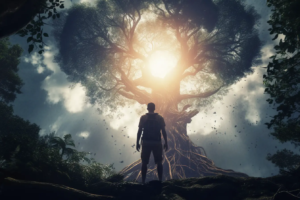Why I’m a Conservative, Part III

In Part I and Part II of this longish essay, I tried to make two points.
In Part I, I pointed out that one of the reasons humans have survived for 160,000+ years is that they became sapient. And, as Yuval Harari, and many others, have pointed out, sapience, in its evolved stages, is mostly about making communal, not individual, decisions.
That’s why anthropological and psychological studies of group decision-making are so important. And when we look at those studies, we see that with all primates – and, in fact, with almost all mammals – group decision-making is not about simply following a leader. For one thing, the leader only lasts as long as his actions are good for the entire group. Plus, to effect any significant change, the leader needs the buy-in of influential members of the rest of the group.
For simplicity’s sake – and notwithstanding the problems of oversimplifying such a complex subject – I suggested the group could be divided into subgroups defined in terms of their knowledge and experience.
In Part II, I attempted to illustrate how these subgroups might interact in group decision-making by imagining how it might play out in a Native American (Indian) culture. I suggested a scene where key members of the tribe had assembled to decide whether or not to go to war with another tribe.
The inexperienced braves, I said, thinking only of the righteousness of their cause, would be all too eager to prove themselves in battle. The more experienced warriors, aware of the potential for both positive and negative outcomes for the tribe, would be cautious about going forward. The aged chief, having by far the most experience, would make the final decision. But first, he brings the group together by acknowledging the feelings of the inexperienced braves, acknowledging the specific knowledge of the older warriors, and then sharing his wisdom by telling a story.
To put this into a more real and contemporary context, I talked about how the same hierarchy exists in the modern military – with decisions made by the top brass taking into consideration how they will affect everyone from the inexperienced recruits at the bottom to the troop and platoon leaders who will be tasked with leading them into battle.
And I pointed out that this interactive structure occurs in every kind of group decision-making that Homo sapiens make – from business, to politics, to sports, education, charitable projects, book clubs, drug-rehab associations, and so on.
In other words, in every type of human interaction (that endures over time), there are three subgroups: the ignorant, the knowledgeable, and the wise. And those that make the best decisions for the group as a whole are not necessarily those that have the smartest and most knowledgeable leaders, but those that involve every member of the group in an appropriate way.
If we look at it from an evolutionary perspective, it’s about survival. Not about the survival of any one particular person or one particular gene pool. It’s about the survival of the species. And that depends, in large part, on the fact that nurturing and sharing have been imbedded in our individual DNAs.
Nature has ordained that all members of a society should have a role in making important decisions that affect the well-being of the entire group. Which ties directly to my argument that the sort of thinking that is good for us as a species is that which includes all but gives deference to the wise.
So that’s what I’m going to argue next. That we all start off ignorant and respond to external conditions with the naïveté of the ignorant. But it’s our responsibility as we move into adulthood and old age to become, as much as possible, wise.
In Part IV of this essay, I’ll tell you why most of what’s wrong with America today is due to my generation’s (the Baby Boomers’) refusal to become wise.
 MarkFord
MarkFord